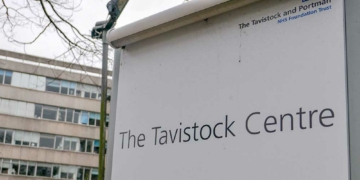At the centre of medical practice is a principle which can be traced to Bronze age Athens, a commitment to primum non nocere or to ‘first do no harm.’ Yesterday, organisers of the European Professional Association for Transgender Health (EPATH) conference were reminded of this, through an open letter coordinated by the group Genspect and signed by organisations from across the world.
EPATH is currently hosting a three-day conference in Gothenburg called ‘Reconnecting and Redefining Transgender Healthcare’. Papers presented cover topics from ‘How tight undergarment and tucking can affect semen quality: a prospective cohort study in transgender women’ to how to respond to negative media coverage and surgical procedures such as ‘Vaginoclitorolabioplasty’.
Genspect is an international alliance of parent and professional groups whose aim is to advocate for parents of gender-questioning children and young people. They want to see clinicians across the world adopt an evidence-based and ethical approach when treating children and young people who identify as trans.
Their director is Stella O’Malley, a psychotherapist and writer who presented the documentary ‘Trans kids: it’s time to talk’ which aired on Channel 4 in December 2018. She told Lesbian and Gay News that parent groups have been struggling to fight powerful organisations like EPATH, who she says:
“seem set on ignoring the contributions of many thousands of parents across the world, all of whom are motivated by the best interests of their distressed children.”
O’Malley added:
“Today marks a new moment for these parents. 22 organisations from 13 different countries have combined forces to ask the same questions. By speaking in unison, these parent groups are showing that it is no longer possible simply to pretend that there is near-universal support for the treatment pathways in place. For now, the ball is firmly in EPATH’s court.”
EPATH are not neutral on these matters. EPATH are the European arm of WPATH, formerly the Harry Benjamin Foundation. Both WPATH and EPATH are more akin to lobby groups working to push the medical boundaries of transition than objective, neutral fora for discussion.
Harry Benjamin, of the eponymous foundation, started his career assisting a quack doctor selling fake cures for tuberculosis, before moving on to hawk testosterone as an anti-aging treatment. In the middle of the last century, working in collaboration with sexologist John Money, Benjamin became a pioneer of so-called sex change. Benjamin posited that a ‘chromosomal sex disturbance’ was responsible for gender dysphoria and that there was a continuum between being male and female. The Harry Benjamin Foundation changed its name to WPATH in 2006. The philosophy which underpins the work of WPATH and EPATH is that procedures offering the appearance of sex change are broadly beneficial to the mental health of patients who identify as trans.
In many European countries, young people aged 16 and under, with no significant history of gender dysphoria in childhood, are prescribed antagonistic hormones and undergo invasive surgeries without thorough assessment.
Genspect are keen to draw attention to what they see as a troubling increase in young people adopting trans identities. In the open letter they note:
‘Over the past decade there has been a 3000% increase in the number of young people seeking treatment for gender dysphoria at the UK’s largest gender clinic. In the United States, nearly one in ten teenagers now report having a transgender identity, whereas in the previous decade, an estimated 2 to 14 in every 100,000 people identified as transgender. Young girls are now the main category treated by specialist doctors.’
‘In many European countries, young people aged 16 and under, with no significant history of gender dysphoria in childhood, are prescribed antagonistic hormones and undergo invasive surgeries without thorough assessment. These practices, based on the recommendations of the World Association of Transgender Health Professionals (WPATH)’.
The letter further points to the moratoria introduced in Great Britain, Sweden and Finland on the prescription of puberty blockers and hormones to children and adolescents. This represents a departure from WPATH’s guidelines, and O’Malley says:
“We’re interested to know what EPATH has to say about the revised protocols in Sweden, Finland and the UK?”
Whilst EPATH and WPATH are clearly aware of the controversy around the treatments offered for gender dysphoric youth, their approach to date seems to be to double down. A statement released in response to the Bell v. Tavistock ruling at the High Court last December outlined their strong disagreement:
‘We oppose this ruling and urge that this ruling be appealed and overturned… We are gravely concerned that the ruling will have a significantly adverse impact upon gender diverse youth and their families by imposing barriers to care that are costly, needlessly intimidating, and inherently discriminatory.’
The conference is due to close today.
























Comments
No comments yet, be the first to leave a comment.